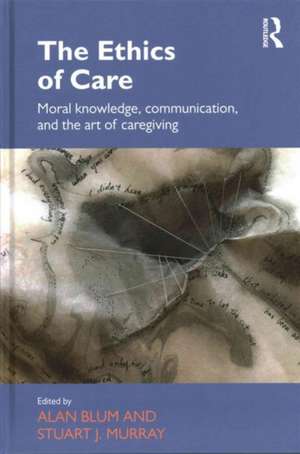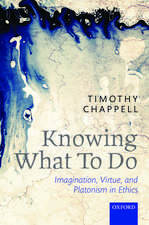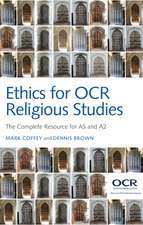The Ethics of Care: Moral Knowledge, Communication, and the Art of Caregiving: Routledge Studies in Health and Social Welfare
Editat de Alan Blum, Stuart Murrayen Limba Engleză Hardback – 3 aug 2016
Organised around the themes of culture as a restraint on caregiving in different social contexts and situations, innovative methods in healthcare, and the way in which culture works to position care as part of a rhetorical approach to dependency, responsibility, and justice, The Ethics of Care presents case studies examining institutional responses to end-of-life issues, the notion of informed consent, biomedicine, indigenous rights and postcolonialism in care and theoretical approaches to the concept of care.
Offering discussions from a variety of disciplinary approaches, including sociology, communication, and social theory, as well as hermeneutics, phenomenology, and deconstruction, this book will appeal to scholars across the social sciences with interests in healthcare, medicine, justice and the question of how we think about care as a notion and social form, and how this is related to practice.
Din seria Routledge Studies in Health and Social Welfare
- 8%
 Preț: 382.25 lei
Preț: 382.25 lei -
 Preț: 370.77 lei
Preț: 370.77 lei -
 Preț: 163.17 lei
Preț: 163.17 lei - 5%
 Preț: 397.72 lei
Preț: 397.72 lei - 5%
 Preț: 460.46 lei
Preț: 460.46 lei -
 Preț: 482.57 lei
Preț: 482.57 lei -
 Preț: 476.64 lei
Preț: 476.64 lei -
 Preț: 482.35 lei
Preț: 482.35 lei -
 Preț: 433.86 lei
Preț: 433.86 lei -
 Preț: 476.60 lei
Preț: 476.60 lei -
 Preț: 490.46 lei
Preț: 490.46 lei -
 Preț: 475.62 lei
Preț: 475.62 lei - 5%
 Preț: 460.05 lei
Preț: 460.05 lei - 5%
 Preț: 433.00 lei
Preț: 433.00 lei - 5%
 Preț: 355.50 lei
Preț: 355.50 lei - 5%
 Preț: 382.54 lei
Preț: 382.54 lei -
 Preț: 376.10 lei
Preț: 376.10 lei -
 Preț: 379.39 lei
Preț: 379.39 lei - 5%
 Preț: 977.11 lei
Preț: 977.11 lei -
 Preț: 311.41 lei
Preț: 311.41 lei
Preț: 1056.28 lei
Preț vechi: 1288.15 lei
-18% Nou
Puncte Express: 1584
Preț estimativ în valută:
202.12€ • 211.56$ • 168.23£
202.12€ • 211.56$ • 168.23£
Carte tipărită la comandă
Livrare economică 31 martie-14 aprilie
Preluare comenzi: 021 569.72.76
Specificații
ISBN-13: 9781472475596
ISBN-10: 1472475593
Pagini: 260
Ilustrații: 16
Dimensiuni: 156 x 234 x 19 mm
Greutate: 0.5 kg
Ediția:1
Editura: Taylor & Francis
Colecția Routledge
Seria Routledge Studies in Health and Social Welfare
Locul publicării:Oxford, United Kingdom
ISBN-10: 1472475593
Pagini: 260
Ilustrații: 16
Dimensiuni: 156 x 234 x 19 mm
Greutate: 0.5 kg
Ediția:1
Editura: Taylor & Francis
Colecția Routledge
Seria Routledge Studies in Health and Social Welfare
Locul publicării:Oxford, United Kingdom
Cuprins
Introduction: The Dialectic of Care
Part 1: Institutional Contraints, Consent and End-of-life
1. Informed Consent and the Social Regulation of Caregiver Involvement in End-of-life Care
2. Judgement, Care and Informed Consent
3. End-of-life Conflicts, the Law and Arendt's Political Thinking
Part 2: Biomedicine, Social Services and Reparation in the Postcolony
4. The Time of a Life: Ethics and Care in the Case of a Young First Nations Girl
5. Community Development Amongst Urban Aboriginals: Case Study of the Healing of the Seven Generations Canoe Project
6. Postcolonial Negotiations: Care, Aboriginal Rights, and the Challenge of Democracy
Part 3: Communication, Ethical Collisions and the Realities of Care
7. End-of-life as a Symbolic Order: Age in an Era of Mechanical Reproduction
8. Good Patient-Bad Patient: The Ethical Imaginary of Cancer
9. The Clinical Epistemology of Ludwig Binswanger (1881-1966): Psychiatry as a Science of the Singular
10. Critique of Solution-focused Brief Therapy
11. Rethinking the Concept of Care
Afterword: Care, Giving: An Ethical Critique
Part 1: Institutional Contraints, Consent and End-of-life
1. Informed Consent and the Social Regulation of Caregiver Involvement in End-of-life Care
2. Judgement, Care and Informed Consent
3. End-of-life Conflicts, the Law and Arendt's Political Thinking
Part 2: Biomedicine, Social Services and Reparation in the Postcolony
4. The Time of a Life: Ethics and Care in the Case of a Young First Nations Girl
5. Community Development Amongst Urban Aboriginals: Case Study of the Healing of the Seven Generations Canoe Project
6. Postcolonial Negotiations: Care, Aboriginal Rights, and the Challenge of Democracy
Part 3: Communication, Ethical Collisions and the Realities of Care
7. End-of-life as a Symbolic Order: Age in an Era of Mechanical Reproduction
8. Good Patient-Bad Patient: The Ethical Imaginary of Cancer
9. The Clinical Epistemology of Ludwig Binswanger (1881-1966): Psychiatry as a Science of the Singular
10. Critique of Solution-focused Brief Therapy
11. Rethinking the Concept of Care
Afterword: Care, Giving: An Ethical Critique
Notă biografică
Alan Blum is Executive Director of the Culture of Cities Centre and Senior Professor of Sociology and Communication and Culture at York University, Canada. He is the author of The Grey Zone in Health and Illness, Theorizing and The Imaginative Structure of the City, and co-author of On the Beginning of Social Inquiry and Self-Reflection in the Arts and Sciences.
Stuart J. Murray is Associate Professor and Canada Research Chair in Rhetoric & Ethics in the Department of English Language & Literature and the Department of Health Sciences at Carleton University, Canada. He is co-editor of Critical Interventions in the Ethics of Healthcare: Challenging the Principle of Autonomy in Bioethics.
Stuart J. Murray is Associate Professor and Canada Research Chair in Rhetoric & Ethics in the Department of English Language & Literature and the Department of Health Sciences at Carleton University, Canada. He is co-editor of Critical Interventions in the Ethics of Healthcare: Challenging the Principle of Autonomy in Bioethics.
Descriere
Organized around the themes of culture as a restraint on caregiving in different social contexts and situations, innovative methods in healthcare, and the way in which culture works to position care as part of a rhetorical approach to dependency, responsibility, and justice, The Ethics of Care presents case studies examining institutional responses to end-of-life issues, the notion of informed consent, biomedicine, indigenous rights and postcolonialism in care and theoretical approaches to the concept of care.














